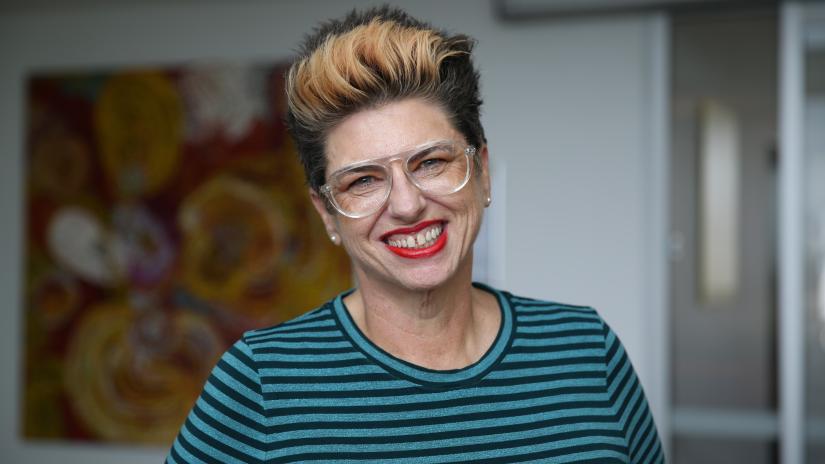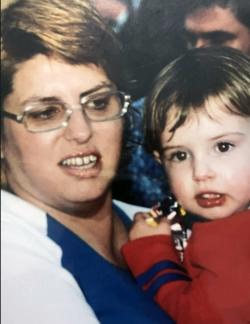Workplace diversity expert Professor Nareen Young has joined UTS Business School as acting Associate Dean (Indigenous Leadership and Engagement).

Professor Nareen Young. Photo: Leilah Schubert
Workplace diversity expert Professor Nareen Young has joined UTS Business School as acting Associate Dean (Indigenous Leadership and Engagement). She will lead the Business School’s portfolio of Indigenous education, research and engagement initiatives. Professor Young has broad experience across academia, corporate and governance roles, most recently as Professor of Indigenous Policy (Indigenous Workforce Diversity) at UTS’s Jumbunna Institute of Education and Research.
What excites you about the new role?
What excites me is bringing the deeply First Nations focus of Jumbunna, and its research and impact work, to the business school. And conversely, applying a business school stamp to the Indigenous employment and business work that we do. I'm really grateful for this opportunity. It's a privilege and I want to use every minute.
What specific projects are you working on?
I’ll continue with the signature Gari Yala (speak the truth) work that we did at Jumbunna, in partnership with Diversity Council Australia, examining employment experiences of Aboriginal and Torres Strait Islander peoples. We've also created a First Nations Employment Alliance, to work on policy and practice issues in the new policy environment. And of course all of the existing duties that the role entails, which was established by Professor Robynne Quiggin.
What do you hope to achieve?
The goal of the Jumbunna Indigenous People and Work Hub has always been to bring an Indigenous perspective to how Aboriginal and Torres Strait Islander people are employed in this country. In doing that we can now say authoritatively that based on our data, and of course every bit of anecdotal evidence that we already knew about, it's very clear that the issue for Indigenous people in terms of work and workforce participation, whether it's at an entry level or at senior executive and board level roles, is workplace racism. So our work will be focused on workplace racism, and pay equity, now that there is scope for Indigenous pay equity to be discussed in the policy sense.
How has your background influenced your current research?

Nareen as Director of the NSW Working Women's Centre with her daughter. (supplied)
I’ve been an employment practitioner for a long time. I've been exclusively an employment diversity practitioner since 1998, so nearly 25 years. I've held two leadership roles in that area; I was director of the New South Wales Working Women's Centre and I was CEO of Diversity Council Australia. For the past five or so years, I've had the privilege of working exclusively in the Indigenous employment area as Director and Employment Lead at PwC’s Indigenous Consulting and then at Jumbunna. I have Indigenous heritage, as well as culturally diverse heritage. It's an area that for me warrants and deserves very close attention in terms of lifting the status of Indigenous people’s workforce participation to an issue that is taken very seriously in the Australian workplace and employment communities on Indigenous people's terms.
I’m also very interested in the impact that research can have in creating change. I've watched academic research have a really big impact in the gender and employment space. For example, Meg Smith from UWS was a board member of the Working Women’s Centre when I first went there and has played such a great activist role combining being an academic with activism. What Liz Hill and Rae Cooper at Sydney University, who now operate The Gender Equality in Working Life Research Initiative, Sarah Charlesworth at RMIT, and originally the amazing Anne Junor who seemed to me to be one of the first mainstream feminists to use research as evidence to create change in the broader policy context around employment, have achieved has had a big impression on me over many years.
The first thing I did at Diversity Council Australia was create its employment diversity research capacity to provide very specific diversity research in the Australian context. And for me, the glaring omission in Indigenous employment policy, just like it is in a lot of areas of Indigenous policy, was the lack of Indigenous voices. There hadn't been any Indigenous-led employment research up until Gari Yala. So I think it's really important, and I wanted to create that Indigenous-led employment research capacity that used Indigenous research methodology, and Jumbunna is so prominent in leading the Indigenous research agenda.
What challenges or surprises have you faced?
I am really direct, which is something I always thought was kind of cultural and just part of my personality. However I was diagnosed with ADHD when I was 57, and as it turns out, it’s an ADHD characteristic. I think it’s fair to say not everyone loves it, so learning to manage that directness is a challenge!
Is there anyone in particular who has inspired you?
Many women over many years, but Distinguished Professor Larissa Behrendt is so generous and gracious to other people in the academy and in the Indigenous and legal policy area, and holistic in her approach, particularly to those who are coming through. All that she's done with Jumbunna, and her capacity to influence is I think, a real inspirational point for me.
And there's so many others – all of the Indigenous academics, especially the women, their tenacity, energy, dedication and focus and resilience in the face of the particular cultural contexts that I’m only really now just learning about in the higher education culture I think needs to be acknowledged. My EA Julia Fernandez, along with my daughter, are the only two First Nations people I know of who are studying gender studies, so I get excited by that, and the possibilities for the influence of Blak feminism within the Australian feminist context. And by all of the Indigenous young people coming through, as well as the privilege of being immersed in Indigenous culture, which I am in continuing to work with Jumbunna, and what it brings to Australian organisations, whether that's universities, government or corporations.

